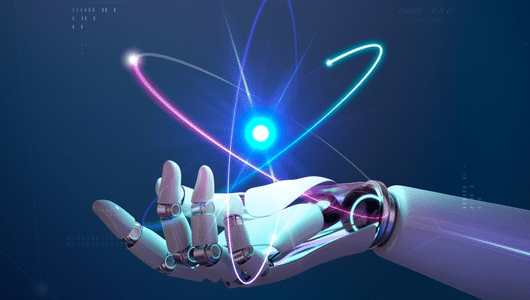Artificial intelligence (AI) has become increasingly prevalent in almost every industry as technology advances. In marketing and web development, AI transforms how businesses approach their strategies and operations. This article will explore how developers and marketers use AI and how this technology changes the industry.
AI Programs for Developers
AI programs are crucial in web development, making development processes more efficient and effective. This article will explore how developers use AI, how it’s changing the industry, and what the future holds.
Machine Learning Algorithms
One of the most significant areas where AI tools impact web development is using machine learning algorithms. Machine learning algorithms are designed to learn and identify patterns in data, and they are increasingly used to create better, more correct code.
Developers can use machine learning algorithms to analyze data and identify patterns that they can use to improve their code. For example, developers can use machine learning algorithms to analyze data about how users interact with a website. This data can include information such as the pages they visit, how long they spend on each page, and their actions on the website.
By analyzing this data, developers can identify patterns and trends that can help them optimize the website for a better user experience. They can use this information to create a more user-friendly website, leading to higher conversion rates and better engagement.
Another area where machine learning is having a significant impact on web development is in the realm of cybersecurity. Machine learning algorithms can analyze network traffic and identify potential threats, allowing developers to proactively identify and address vulnerabilities before they can be exploited. This can be especially useful for businesses that deal with sensitive data or financial transactions, as it can help protect against data breaches and other cyber attacks.
Fraud Detection
Machine learning can detect fraudulent activities on a website, such as credit card fraud, account takeover, and bot attacks. For example, a machine learning model could be trained to detect patterns of fraudulent behavior and flag suspicious transactions for further investigation.
Personalized Content
Personalization is an essential aspect of modern web development, as it helps websites provide a tailored experience to each user. Machine learning algorithms can analyze user behavior and preferences and use that data to provide personalized recommendations and content. For example, Netflix uses machine learning algorithms to analyze user viewing history and recommend new content based on their interests.
Image and Video Recognition
Image and video recognition technology are becoming increasingly sophisticated, and machine learning algorithms are at the heart of this development. Web developers can use photo and video recognition to identify and classify images and videos on their websites, making it easier to organize and categorize the content. This can be particularly useful for e-commerce sites, where product images must be accurately identified and classified.
Automating Tedious Tasks
AI programs are also being used to automate tedious tasks that are typically time-consuming and require manual input. These programs are designed to perform tasks that can be automated, allowing developers to focus on more important work.
As a web developer, many tedious and repetitive tasks must be performed regularly. For example, let’s say you’re building a website that allows users to upload images. As part of the process, you want to ensure that each image meets specific quality standards, such as a minimum size or resolution. Reviewing each image to ensure it meets these standards can be time-consuming and monotonous.

This is where AI can come in and help automate the process. Using machine learning algorithms, you can train a model to automatically recognize and flag any images that do not meet your quality standards. This would allow you to quickly review and approve the images that meet the criteria, saving you significant time and effort.
Another example of a tedious task that AI can automate is testing a website’s compatibility across different browsers and devices. This can be time-consuming and error-prone, requiring manually trying the website on various instruments and browsers.
Using AI, you can train a model to automatically test your website’s compatibility across various devices and browsers. This can be done by using virtual machines or emulators to simulate different devices and browsers and then running automated tests on those simulated devices. This would allow you to quickly identify and address compatibility issues before deploying your website.
Identifying Security Vulnerabilities
Another area where AI tools have a significant impact on web development is in the identification of security vulnerabilities in code. Security vulnerabilities can be a considerable problem for websites, as hackers can exploit them to gain unauthorized access to the site or steal sensitive information.
AI programs can help identify potential security vulnerabilities by analyzing the code for potential issues. Developers can prevent security breaches and protect sensitive information by identifying and fixing these vulnerabilities before they become problematic.
For example, AI can analyze large volumes of data to identify and address vulnerabilities in web applications. For example, developers can use AI-powered tools to scan web applications and identify potential security flaws in their code, such as SQL injection vulnerabilities or cross-site scripting (XSS) attacks.
Another way AI can improve web security is by identifying and blocking bot traffic. Many websites are plagued by bot traffic, which can be used to scrape data or launch attacks, and AI can help detect and block this traffic, improving the site’s overall security.
Additionally, AI can improve web security through user behavior analytics. AI algorithms can detect and flag suspicious activity by analyzing user behavior patterns. For example, suppose a user suddenly begins accessing large amounts of data or attempting to log in from multiple locations. In that case, it could be a sign that their account has been compromised. AI can quickly identify these patterns and alert developers to take action.
AI can also be used to improve authentication and access control. One example is facial recognition technology, which can authenticate users before granting access to a system or service. Similarly, AI can be used to analyze and predict the behavior of users to ensure that only authorized individuals are given access to sensitive data and resources.
Finally, AI can be used to detect and prevent distributed denial of service (DDoS) attacks. DDoS attacks involve overwhelming a web server with traffic to take it offline. By using machine learning to analyze traffic patterns, web developers can identify and mitigate potential DDoS attacks before they happen. AI can also be used to create automatic blocklists of IP addresses known to be involved in DDoS attacks.
AI-Powered Development Tools
AI-powered development tools are transforming how web developers work by automating tedious tasks and enhancing the quality of their code. These tools leverage the power of machine learning algorithms to provide suggestions for improvement, identify errors, and optimize code. This can save developers significant time, allowing them to focus on more complex tasks and improve their code’s overall quality.
One widespread use of AI-powered development tools is in code analysis. Code analysis involves examining code to identify errors, improve code quality, and increase performance. Tools such as DeepCode and Codacy can analyze code, identify issues such as incorrect syntax, unused code, and potential vulnerabilities, and provide suggestions for improvement. This can help developers create more efficient code, reduce errors, and improve the security of their applications.
Another way AI-powered development tools can help web developers is by automating tedious tasks. For example, CodeGuru from AWS can automatically review code and provide suggestions for improvement. This tool can also help developers optimize their applications by identifying code paths that are slow or inefficient.
AI-powered development tools can also help with debugging. Tools such as TabNine and Kite use machine learning to suggest potential bug fixes based on the code context. This can save developers significant time, allowing them to focus on more complex tasks.
Moreover, AI-powered development tools are also being used to improve the accessibility of web applications. Accessibility is critical in web development, as it ensures that all users can access and use web applications regardless of their abilities. Tools such as accessiBe use machine learning algorithms to analyze web applications and make them more accessible. This can include adding alt tags to images, improving color contrast, and enabling keyboard navigation.
In addition, AI-powered development tools can also assist in optimizing and building web applications. For example, Cloudinary uses AI to optimize images, videos, and other media files used in web applications. This can help to reduce the size of these files, resulting in faster load times and improved user experience.
AI Programs for Marketers
AI tools are also transforming the marketing world, allowing businesses to create more personalized and effective campaigns. One way in which marketers are using AI is through predictive analytics. Predictive analytics involves using data, statistical algorithms, and machine learning techniques to identify the likelihood of future outcomes.
For example, AI programs can analyze customer data to determine which customers are most likely to purchase a particular product. This information can then be used to create targeted marketing campaigns that are more likely to convert these customers into buyers.
Predictive Analytics
Predictive analytics is a data-driven technology that helps businesses identify patterns and trends in data sets, allowing them to predict future outcomes. This technology benefits firms that rely heavily on customer data, such as e-commerce sites, subscription-based services, and online retailers.
One of the key benefits of predictive analytics is that it can help businesses to identify the most profitable customer segments. By analyzing customer demographics, purchase history, and online behavior, predictive analytics algorithms can identify patterns and trends that can help businesses target their marketing efforts more effectively.
For example, a subscription-based streaming service may use predictive analytics to identify which customers are most likely to churn (cancel their subscription) and which are most likely to upgrade to a more expensive subscription tier. By targeting customers who are most likely to churn with personalized offers and discounts, the service can reduce its churn rate and increase its customer lifetime value.

In addition, predictive analytics can also be used to optimize pricing strategies. By analyzing customer behavior and market trends, predictive analytics algorithms can help businesses identify the optimal price point for their products or services, maximizing revenue while remaining competitive in the market.
Another benefit of predictive analytics is that it can help businesses to identify areas where they can improve their operations. By analyzing data on customer complaints, support tickets, and other metrics, predictive analytics algorithms can identify patterns and trends that can help businesses to identify areas where they can improve their products or services.
For example, a software company may use predictive analytics to analyze customer support tickets and identify the most common issues that customers are experiencing. By addressing these issues in future software updates, the company can improve customer satisfaction and reduce the number of support tickets that need to be handled.
Natural language Processing
Natural Language Processing (NLP) is a field of artificial intelligence (AI) that deals with interactions between computers and natural languages, including speech and text. It is becoming increasingly crucial for businesses that want to understand their customers and engage with them more meaningfully. AI-powered NLP can help companies to analyze and make sense of large amounts of text data, from social media posts and customer reviews to email and chatbot interactions.
One of the key benefits of using NLP for marketing is the ability to identify the sentiment behind customer interactions. With AI-powered NLP, businesses can analyze customer conversations and social media posts to determine whether customers express positive, negative, or neutral feelings. This information can be used to create more targeted and relevant marketing campaigns. For example, a business can use NLP to detect negative sentiment towards a particular product and quickly address the issue, improving customer satisfaction and loyalty.
NLP can also be used for chatbots and voice assistants. These tools use NLP to understand customer queries and provide relevant responses. Using machine learning algorithms, chatbots and voice assistants can learn from customer interactions, becoming more accurate and efficient. This can help businesses save time and resources, as they can handle customer inquiries and support more efficiently.
Another critical application of NLP in marketing is content optimization. NLP can analyze customer interactions and identify the keywords and phrases customers use most often. This information can be used to optimize website content and improve search engine rankings. Businesses can use AI-powered NLP to analyze customer interactions to create more relevant, engaging content that resonates with their target audience.
In addition to customer interactions, NLP can analyze news and media coverage. By monitoring news and social media, businesses can stay on top of trends and public opinion. NLP can identify topics and sentiments in news and social media, allowing companies to adjust their marketing strategies accordingly.
AI-powered NLP can help businesses better understand their customers and create more effective marketing campaigns. Companies can create more targeted and personalized marketing campaigns that improve customer satisfaction and loyalty by analyzing customer interactions, chatbot and voice assistant queries, and news and media coverage. With the increasing availability of AI-powered NLP tools, businesses of all sizes can take advantage of these benefits and stay ahead of the competition.
Marketing Automation
Marketing automation is becoming an increasingly popular application of AI tools in marketing. With the help of AI-powered tools, businesses can automate specific marketing tasks, such as lead generation and email marketing, and focus their efforts on the most profitable customer segments.
One example of AI-powered marketing automation is lead generation. AI-powered lead generation tools can analyze customer data and identify potential leads most likely to convert into customers. These tools can use machine learning algorithms to analyze customer behavior and identify patterns that indicate a high likelihood of conversion. Using AI-powered lead generation tools, businesses can save time and resources by focusing on the leads most likely to generate revenue.
Customer Segmentation
One of the marketers’ most significant challenges is understanding their customers and creating personalized campaigns that resonate with them. However, with the massive amount of customer data available today, it can be overwhelming for marketers to analyze it manually and derive meaningful insights.
This is where AI-powered customer segmentation comes in. AI can segment customers into distinct groups based on their preferences and behaviors by analyzing customer data such as demographics, behavior, and purchasing history. This segmentation can help marketers better understand their customers and create more targeted marketing campaigns.

For example, an e-commerce business can use AI to segment its customers into groups based on past purchases. They can then create targeted email campaigns for each segment, featuring products most likely to interest that particular group of customers. This approach can lead to more personalized and relevant marketing campaigns, increasing engagement and conversions.
AI tools can also help businesses identify customer segments they may not have considered. For instance, an online retailer may find that customers who purchase gardening tools are likelier to purchase outdoor furniture than those who buy home decor items. By segmenting these customers into a distinct group, the retailer can create targeted campaigns for this new segment, resulting in more conversions and revenue.
In summary, AI-powered customer segmentation can help marketers better understand their customers and create more personalized campaigns that resonate with them. Businesses can save time and resources by automating the customer segmentation process while increasing engagement and revenue.
Email Marketing
AI-powered email marketing tools can also help businesses to personalize their email campaigns. By analyzing customer data, AI can identify each customer’s preferences and interests and then tailor the content of the email to match those preferences. This can make the email more relevant and engaging for the customer, increasing the likelihood that they will click through and make a purchase.
Moreover, AI can segment customers into different groups based on their behavior and preferences. For example, recently purchased customers might receive another type of email than those who last purchased a while ago. By segmenting customers in this way, businesses can ensure that they send the most relevant and targeted emails to each customer, improving the effectiveness of their email campaigns.
Another way in which AI can improve email marketing is by using predictive analytics to identify customers who are at risk of unsubscribing or churning. By analyzing customer data, AI can identify patterns of behavior associated with customers who are likely to leave and then send targeted emails to try to retain those customers. This can help businesses to reduce their churn rate and keep more customers over the long term.
Finally, AI can measure the success of email campaigns in real-time, allowing businesses to make adjustments and optimize their movements on the fly. By analyzing open rates, click-through rates, and other metrics, AI can identify which email campaign elements are working well and which need improvement. This can help businesses continually refine and improve their email marketing efforts, leading to better results.
In summary, AI is a powerful tool for email marketing that can help businesses improve their campaigns’ effectiveness, increase engagement and conversions, and retain more customers over the long term.
AI Chatbots
AI chatbots are an increasingly popular business tool to enhance customer service and support. With AI, chatbots can provide more personalized and engaging customer experiences, making it easier for businesses to communicate and interact with their audience.
One of the most significant benefits of using AI chatbots is that they can provide immediate customer assistance 24/7. This means that businesses can improve their customer service while reducing the need for human intervention, which can be costly and time-consuming. AI chatbots can be integrated with popular messaging platforms like Facebook Messenger, WhatsApp, and Slack, providing businesses with a more direct and efficient way to engage with customers.
AI chatbots can also automate lead generation and nurturing, helping businesses identify and qualify potential leads. AI chatbots can identify key insights and behaviors that indicate a customer’s interest and engagement with a product or service by analyzing customer interactions. This information can personalize the customer experience and guide them through the sales funnel.
Moreover, AI chatbots can provide customers with tailored recommendations based on their preferences and past purchases. This can significantly improve the customer experience and drive sales, as customers are more likely to purchase products relevant to their needs and interests.
Finally, AI chatbots can learn from every conversation and improve their responses. This means they can provide support and customer service more efficiently and accurately. As businesses continue to use chatbots, customer service and support quality is expected to improve significantly.
AI chatbots are an excellent tool for businesses to enhance customer service and support while increasing efficiency and driving sales. With the ability to provide immediate assistance, personalized recommendations, and automate lead generation, AI chatbots are becoming an indispensable tool for businesses looking to improve customer engagement and ROI.
Summary of How AI Can Assist Marketers and Web Developers
AI programs are transforming the world of marketing and web development. They are helping developers to create better, more accurate code and to automate time-consuming tasks. AI also allows marketers to create more personalized and effective campaigns by analyzing customer data and sentiment.
We can expect AI to become even more prevalent in the industry as technology advances. By embracing this technology, businesses can stay ahead of the curve and provide better customer experiences.
